 W
WUrban agriculture, urban farming, or urban gardening is the practice of cultivating, processing, and distributing food in or around urban areas. Urban agriculture is also the term used for animal husbandry, aquaculture, urban beekeeping, and horticulture. These activities occur in peri-urban areas as well. Peri-urban agriculture may have different characteristics.
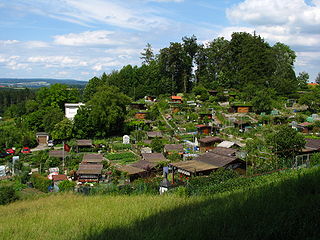 W
WAn allotment garden, often called simply an allotment, or in North America, a community garden, is a plot of land made available for individual, non-commercial gardening or growing food plants. Such plots are formed by subdividing a piece of land into a few or up to several hundred parcels that are assigned to individuals or families. Such parcels are cultivated individually, contrary to other community garden types where the entire area is tended collectively by a group of people. In countries that do not use the term "allotment (garden)", a "community garden" may refer to individual small garden plots as well as to a single, large piece of land gardened collectively by a group of people. The term "victory garden" is also still sometimes used, especially when a community garden dates back to the First or Second World War.
 W
WThe Bay View Garden And Yard Society is a nonprofit 501(c)(7) organization based in the Bay View neighborhood of Milwaukee, Wisconsin, United States.
 W
WBeacon Food Forest is a 7-acre food forest in development adjacent to Jefferson Park on Beacon Hill in Seattle, Washington in the vicinity of 15th Ave South and South Dakota. As the area sits on land owned by Seattle Public Utilities, it is believed to be the largest food forest on public land in the United States. The project also has more traditional private allotments, similar to those in other local P-Patch gardens.
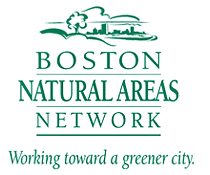 W
WThe Boston Natural Areas Network (BNAN), founded in 1977 is a non-profit organization based in Boston, in the U.S. state of Massachusetts, which works to identify and protect significant natural areas described as urban wilds and greenways in the metropolitan area.
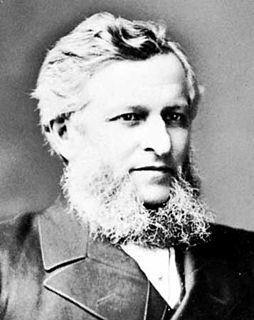 W
WJesse Collings was Mayor of Birmingham, England, a Liberal member of Parliament, but was best known nationally in the UK as an advocate of educational reform and land reform.
 W
WThe Columbia Agriculture Park is a public park in Columbia, Missouri focusing on food production and distribution. It is home to the Columbia Farmers Market, and contains a pavilion with space for 98 vendors. The park opened in 2019 and by 2021 will include an interactive urban farm, demonstration gardens and orchards, a commercial kitchen, event space, a recreational trail, amphitheater, outdoor classroom, and playground. It will also house the offices of the Columbia Center for Urban Agriculture and a resource center. The park was created by a public-private partnership between Columbia Parks and Recreation, the Columbia Farmers Market, the Columbia Center for Urban Agriculture, and Sustainable Farms and Communities. It is the first of its kind in Missouri.
 W
WCommunity gardening in the United States functions as ecological green space, a gathering place for neighbors, a positive contribution to the reduction of food insecurity, promotes healthier eating through education programs, and provides access to gardening gardening to those who otherwise could not have a garden, such as the elderly, recent immigrants, urban dwellers, or the homeless. Some gardens are worked as community farms with no individual plots at all, similar to urban farms. Other gardens resemble European "allotment" gardens, with plots where individuals and families can grow vegetables and flowers; including a number which began as "victory gardens" during World War II.
 W
WCommunity-supported agriculture or cropsharing is a system that connects the producer and consumers within the food system more closely by allowing the consumer to subscribe to the harvest of a certain farm or group of farms. It is an alternative socioeconomic model of agriculture and food distribution that allows the producer and consumer to share the risks of farming. The model is a subcategory of civic agriculture that has an overarching goal of strengthening a sense of community through local markets.
 W
WContainer gardening or pot gardening/farming is the practice of growing plants, including edible plants, exclusively in containers instead of planting them in the ground. A container in gardening is a small, enclosed and usually portable object used for displaying live flowers or plants. It may take the form of a pot, box, tub, basket, tin, barrel or hanging basket.
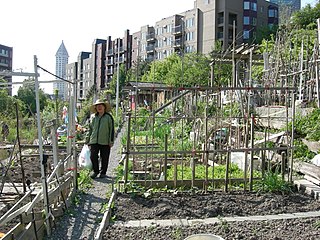 W
WThe Danny Woo International District Community Garden is a community garden on the outskirts of the International District, Seattle, Washington. It was built in 1975 and provides 101 allotments and 77 fruit trees.
 W
WDC State Fair is an organization in Washington, D.C., that is culturally analogous to state fairs elsewhere in the United States. It is an organization dedicated to showcasing D.C. residents' talents in baking, cooking, brewing, crafting, gardening and sewing.
 W
WDeWitt Clinton Park is a 5.8-acre (23,000 m2) New York City public park in the Hell's Kitchen neighborhood of Manhattan, New York City, between West 52nd and 54th Streets, and Eleventh and Twelfth Avenues.
 W
WEcological sanitation, commonly abbreviated as ecosan, is an approach to sanitation provision which aims to safely reuse excreta in agriculture. It is an approach, rather than a technology or a device which is characterized by a desire to "close the loop", mainly for the nutrients and organic matter between sanitation and agriculture in a safe manner. One of the aims is to minimise the use of non-renewable resources. When properly designed and operated, ecosan systems provide a hygienically safe system to convert human excreta into nutrients to be returned to the soil, and water to be returned to the land. Ecosan is also called resource-oriented sanitation.
 W
WThe term ferme ornée as used in English garden history derives from Stephen Switzer's term for 'ornamental farm'. It describes a country estate laid out partly according to aesthetic principles and partly for farming. During the eighteenth century the original ferme ornée was Woburn Farm, made by Philip Southcote, who bought the property in 1734. William Shenstone's garden at The Leasowes was also a ferme ornée. Marie Antoinette made a later example at Versailles in the form of the Hameau de la Reine, created between 1783 and 1787, but it was much more for pleasure than for food production. The Dessau-Wörlitz Garden Realm was said to be the largest ferme ornée in 18th-century Europe. The most complete surviving example is said to be Larchill near Kilcock, Ireland.
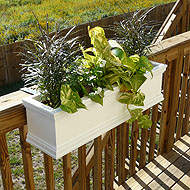 W
WA flower box is a type of container in the form of a planter or box that is usually placed outdoors and used for displaying live plants and flowers, but it may also be used for growing herbs or other edible plants.
 W
WFood security is a measure of the availability of food and individuals' ability to access it. According the United Nations’ Committee on World Food Security, food security is defined as the means that all people, at all times, have physical, social, and economic access to sufficient, safe, and nutritious food that meets their food preferences and dietary needs for an active and healthy life. The availability of food irrespective of class, gender or region is another one. There is evidence of food security being a concern many thousands of years ago, with central authorities in ancient China and ancient Egypt being known to release food from storage in times of famine. At the 1974 World Food Conference the term "food security" was defined with an emphasis on supply; food security is defined as the "availability at all times of adequate, nourishing, diverse, balanced and moderate world food supplies of basic foodstuffs to sustain a steady expansion of food consumption and to offset fluctuations in production and prices". Later definitions added demand and access issues to the definition. The final report of the 1996 World Food Summit states that food security "exists when all people, at all times, have physical and economic access to sufficient, safe and nutritious food to meet their dietary needs and food preferences for an active and healthy life."
 W
WFoodscaping is a modern term for the practice of integrating edible plants into ornamental landscapes. It is also referred to as edible landscaping and has been described as a crossbreed between landscaping and farming. As an ideology, foodscaping aims to show that edible plants are not only consumable, but can also be appreciated for their aesthetic qualities. Foodscaping spaces are seen as multi-functional landscapes which are visually attractive and also provide edible returns.
 W
WThe Galleria at Erieview is a two floor shopping mall that opened in 1987 in Cleveland, Ohio, United States, on the east side of the city's downtown. It is adjacent to the Erieview Tower, a 40-story office building. The Galleria is a few blocks away from the Rock and Roll Hall of Fame.
 W
WThe Garden is a 2008 American documentary film directed by Scott Hamilton Kennedy. It tells the story of the now demolished South Central Farm; a community garden and urban farm located in Los Angeles, California. The Garden details the plight of the South Central Farmers, a mostly Latin community of farmers who organized and worked on the farm. After a suspected back room deal, the land upon which the farm operated was sold from the city back to the original owner, Ralph Horowitz. He then decided he did not want to allow the farmers to use it anymore. Despite efforts to keep their farm, the South Central Farmers were evicted and their garden was bulldozed. The film was nominated for an Academy Award for Best Documentary Feature on 22 January 2008.
 W
WA green roof or living roof is a roof of a building that is partially or completely covered with vegetation and a growing medium, planted over a waterproofing membrane. It may also include additional layers such as a root barrier and drainage and irrigation systems. Container gardens on roofs, where plants are maintained in pots, are not generally considered to be true green roofs, although this is debated. Rooftop ponds are another form of green roofs which are used to treat greywater. Vegetation, soil, drainage layer, roof barrier and irrigation system constitute green roof.
 W
WA green wall is a vertical greening typology, where a vertical built structure is intentionally covered by vegetation. Green walls include a vertically applied growth medium such as soil, substitute substrate, or hydroculture felt; as well as an integrated hydration and fertigation delivery system. They are also referred to as living walls or vertical gardens, and widely associated with the delivery of many beneficial ecosystem services.
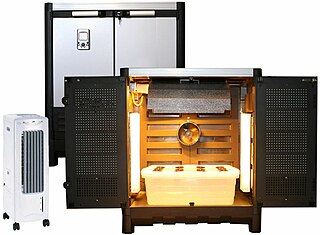 W
WA grow box is a partially or completely enclosed system for raising plants indoors or in small areas. Grow boxes are used for a number of reasons, including lack of available outdoor space or the desire to grow vegetables, herbs or flowers during cold weather months. They can also help protect plants against pests or disease.
 W
WA growbag is a large plastic bag filled with a growing medium and used for growing plants, usually tomatoes or other salad crops. The growing medium is usually based on a soilless organic material such as peat, coir, composted green waste, composted bark or composted wood chips, or a mixture of these. Various nutrients are added, sufficient for one season's growing, so frequently only planting and watering are required of the end-user. Planting is undertaken by first laying the bag flat on the floor or bench of the growing area, then cutting access holes in the uppermost surface, into which the plants are inserted.
 W
WGrowing Power is an urban agriculture organization headquartered in Milwaukee, Wisconsin. It runs the last functional farm within the Milwaukee city limits and also maintains an active office in Chicago. Growing Power aims for sustainable food production, as well as the growth of communities through the creation of local gardens and Community Food Systems. They implement their mission by providing hands-on training, on-the-ground demonstration, outreach and technical assistance.
 W
WGuerrilla gardening is the act of gardening on land that the gardeners do not have the legal rights to cultivate, such as abandoned sites, areas that are not being cared for, or private property. It encompasses a diverse range of people and motivations, ranging from gardeners who spill over their legal boundaries to gardeners with political influences who seek to provoke change by using guerrilla gardening as a form of protest or direct action. This practice has implications for land rights and land reform; aiming to promote re-consideration of land ownership in order to assign a new purpose or reclaim land that is perceived to be in neglect or misused.
 W
WHeeley City Farm is a city farm in the district of Heeley, Sheffield, South Yorkshire, England. It is a community-based and led training, employment and youth enterprise.
 W
WA hobby farm is a smallholding or small farm that is maintained without expectation of being a primary source of income. Some are merely to provide some recreational land, and perhaps a few horses for the family's children. Others are managed as working farms for sideline income, or are even run at an ongoing loss as a lifestyle choice by people with the means to do so, functioning more like a country home than a business.
 W
WThe Incredible Edible project is an urban gardening project which was started in 2008 by Pamela Warhurst, Mary Clear and a group of like minded people in Todmorden, West Yorkshire, UK. The project aims to bring people together through actions around local food, helping to change behaviour towards the environment and to build a kinder and more resilient world. In some cases, it also envisions to have the groups become self-sufficient in food production, hence having all food being produced locally.
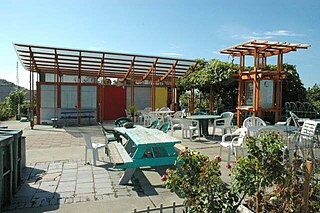 W
WInterbay P-Patch, "The Garden Between The Bays", is one of Seattle, Washington's largest and most involved community gardens, and is recognized as an example of resourcefulness and sustainability.
 W
WIntercropping is a multiple cropping practice that involves growing two or more crops in proximity. In other words, intercropping is the cultivation of two or more crops simultaneously on the same field. The most common goal of intercropping is to produce a greater yield on a given piece of land by making use of resources or ecological processes that would otherwise not be utilized by a single crop.
 W
WA permaculture project is a deployment of permaculture practices on an ongoing basis.
 W
WManor Garden Allotments were allotment gardens occupying 4.5 acres (18,000 m2) between the River Lea and the Channelsea River in Hackney Wick, London, England. They are also sometimes referred to as Eastway Allotments, particularly in the 2012 Summer Olympics planning application documents. They were demolished to make way for the Olympic site. The site was formerly in the London Borough of Hackney, but after ward boundary changes in the 1990s the footprint sat within London Borough of Newham. At the time of eviction the site was owned by Lee Valley Regional Park Authority. The "Eastway Allotments" were known more locally as "Abbott's Shoot" or "Bully Fen".
 W
WA market garden is the relatively small-scale production of fruits, vegetables and flowers as cash crops, frequently sold directly to consumers and restaurants. The diversity of crops grown on a small area of land, typically from under one acre to a few acres, or sometimes in greenhouses distinguishes it from other types of farming. Such a farm on a larger scale is sometimes called a truck farm.
 W
WMeanwood Valley Urban Farm is a city farm established in 1980 in Meanwood, Leeds, England, which has animals and crops and an environmentally friendly visitors centre. The farm is on Meanwood Beck and occupies 24 acres (97,000 m2). The main entrance is on Sugarwell Road.
 W
WThe Michigan Urban Farming Initiative is a 501(c)(3) nonprofit organization in Detroit, Michigan, dedicated to urban agriculture and social justice. MUFI is based in the North End district of central Detroit, where it operates a large multipurpose site. It also has a presence in Woodward Village, a separate neighborhood in Detroit.
 W
WNokken is a self-built community located on the north-west coast of Amager, just south of Islands Brygge, in Copenhagen, Denmark.
 W
WNorthfield Allotments are allotments in the Northfields district of Ealing. They are the oldest allotments in London, having been created from common land in 1832 as Ealing Dean Common Allotments. Originally, their area was over twenty acres but this has been reduced by encroachment, taking about 60% of the land for other developments. The remaining allotments are recognised as an asset of community value and Site of Importance for Nature Conservation.
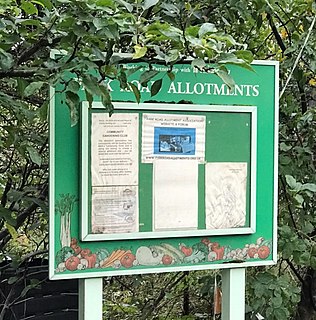 W
WPark Road Allotments are allotments in Old Isleworth. They were managed by the local council who rented the land from the estate of the Duke of Northumberland. The allotments are recognised as an asset of community value but, in 2015 when the 100-year lease expired, they were threatened by redevelopment by the Duke, who proposed to build flats and houses upon the site while providing allotment space in nearby Syon Park. These plans were opposed by local parties such as the Isleworth Society and, on 20 June 2017, the planning committee of Hounslow council rejected them. The matter was then appealed and a public inquiry started on 9 October 2018.
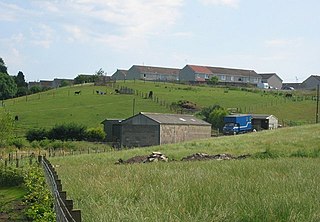 W
WPeri-urban regions can be defined as 'superficial' rural areas that are within the orbit of immediate urban hubs, in other words, areas that surround large population centers. These regions can also be referred to as 'exurban areas', 'the rural-urban fringe' or the 'fringe', they include the transition zones between the outer limits of the commuter belt and the edge of newly constructed suburban areas.
 W
WRecreating Eden is a Canadian lifestyle and gardening television documentary program. Its aim is to examine the physical, mental, and spiritual healing effects that gardens have on their keepers
 W
WA roof garden is a garden on the roof of a building. Besides the decorative benefit, roof plantings may provide food, temperature control, hydrological benefits, architectural enhancement, habitats or corridors for wildlife, recreational opportunities, and in large scale it may even have ecological benefits. The practice of cultivating food on the rooftop of buildings is sometimes referred to as rooftop farming. Rooftop farming is usually done using green roof, hydroponics, aeroponics or air-dynaponics systems or container gardens.
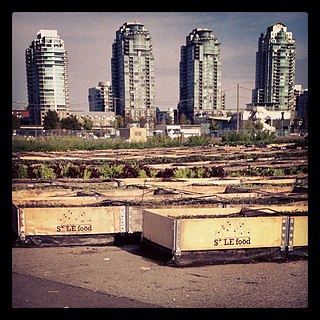 W
WSole Food Street Farms is an urban agriculture project in Vancouver, British Columbia, Canada. Founded in 2008 by Michael Ableman and Seann Dory, Sole Food's mission is to provide low-income residents of the Downtown Eastside with "jobs, agricultural training, and inclusion in a supportive community of farmers and food lovers." It is a subsidiary of Cultivate Canada, a local charity that promotes human ecology-related social projects. Sole Food is the largest urban farm attempted in Vancouver, and through it Ableman hopes to demonstrate that "urban agriculture can in fact be considered a serious enterprise for urban areas." He emphasizes that it is of a larger scale than community gardens and that it could be a "serious enterprise for urban areas." Since its inception, Sole Food has been met with significant community support. Grants from a variety of sources including the city of Vancouver, banks, as well as philanthropists enable Sole Food to continue expanding their operations. Sole Food's vision aligns closely with Vancouver’s Greenest City 2020 Action plan to increase production of locally grown food, hence the city has provided them with generous support. Being a non-profit social initiative, priority is placed upon improving the community: employees, many of whom are current or recovering drug addicts receive paid training, and 10% of the produce harvested is donated to neighbourhood agencies. Due to the small scale of Sole Food and the use of high-quality seeds, the food produced is relatively expensive compared to conventionally grown crops. As such, the food grown does not go toward feeding impoverished residents of the Downtown Eastside, but rather to a number of upscale restaurants that specialize in locally sourced ingredients. The produce is sold to 30 restaurants in Vancouver that specialize in using locally-sourced ingredients. It also sells to seven local farmers’ markets.
 W
WThe Southeast Asia Rural Social Leadership Institute or SEARSOLIN is one of the research and social outreach units of Xavier University – Ateneo de Cagayan, located in Cagayan de Oro, Philippines.
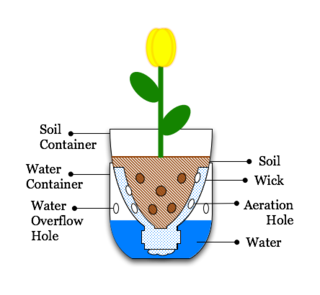 W
WSub-irrigated planter (SIP) is a generic name for a special type of planting box used in container gardening and commercial landscaping. A SIP is any method of watering plants where the water is introduced from the bottom, allowing the water to soak upwards to the plant through capillary action. It is possible to automate the watering and thus SIPs are popular with professional landscapers in buildings or urban settings. Commercialized versions of a Sub-irrigated planter condenses humidity from the environment and feed it directly into the plants' roots. SIPs are available as commercial products or as do-it-yourself projects made from plastic buckets, boxes or storage totes. One of the disadvantages of such closed systems is that soluble salts cannot be flushed into the lower soil profile and build up over time.
 W
WThe Subsistence Homesteads Division of the US Department of the Interior was a New Deal agency that was intended to relieve industrial workers and struggling farmers from complete dependence on factory or agricultural work. The program was meant to provide relatively low cost homesteads, including a home and small plots of land that would allow them to sustain themselves; through the program, thirty-four communities were built. Unlike subsistence farming, subsistence homesteading is based on a family member or members having part-time, paid employment.
 W
WUrban agriculture in West Oakland involves the implementation of Urban agriculture in Oakland.
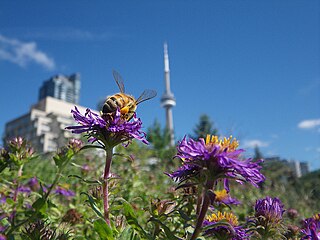 W
WUrban beekeeping is the practice of keeping bee colonies in urban areas. It may also be referred to as hobby beekeeping or backyard beekeeping. Bees from city apiaries are said to be "healthier and more productive than their country cousins". Their presence also provides cities with environmental and economic benefits.
 W
WHorticulture is the science and art of growing fruits and vegetables and also flowers or ornamental plants.
 W
WVertical farming is the practice of growing crops in vertically stacked layers. It often incorporates controlled-environment agriculture, which aims to optimize plant growth, and soilless farming techniques such as hydroponics, aquaponics, and aeroponics. Some common choices of structures to house vertical farming systems include buildings, shipping containers, tunnels, and abandoned mine shafts. As of 2020, there is the equivalent of about 30 ha of operational vertical farmland in the world. The modern concept of vertical farming was proposed in 1999 by Dickson Despommier, professor of Public and Environmental Health at Columbia University. Despommier and his students came up with a design of a skyscraper farm that could feed 50,000 people. Although the design has not yet been built, it successfully popularized the idea of vertical farming. Current applications of vertical farmings coupled with other state-of-the-art technologies, such as specialized LED lights, have resulted in over 10 times the crop yield than would receive through traditional farming methods.
 W
WVictory gardens, also called war gardens or food gardens for defense, were vegetable, fruit, and herb gardens planted at private residences and public parks in the United States, United Kingdom, Canada, Australia and Germany during World War I and World War II. In wartime, governments encouraged people to plant victory gardens not only to supplement their rations but also to boost morale. They were used along with Rationing Stamps and Cards to reduce pressure on the public food supply. Besides indirectly aiding the war effort, these gardens were also considered a civil "morale booster" in that gardeners could feel empowered by their contribution of labor and rewarded by the produce grown. This made victory gardens a part of daily life on the home front.
 W
WThe Village Roots Garden is a community garden located at 1115 E. Otjen Street in the Bay View neighborhood of Milwaukee, Wisconsin.
 W
WA window box is a type of flower container for live flowers or plants in the form of a box attached on or just below the sill of a window. It may also be used for growing herbs or other edible plants.
 W
WA Windowfarm is a hydroponic urban gardening system that was originally developed by Britta Riley using open-source designs. A Windowfarm is an indoor garden that allows for year-round growing in almost any window. It lets plants use natural light, the climate control of your living space, and organic “liquid soil.”
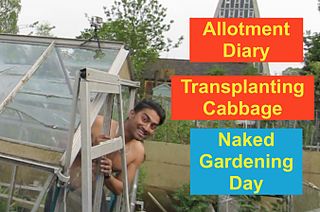 W
WWorld Naked Gardening Day (WNGD) is an annual international event generally celebrated on the first Saturday of May by gardeners and non-gardeners alike.